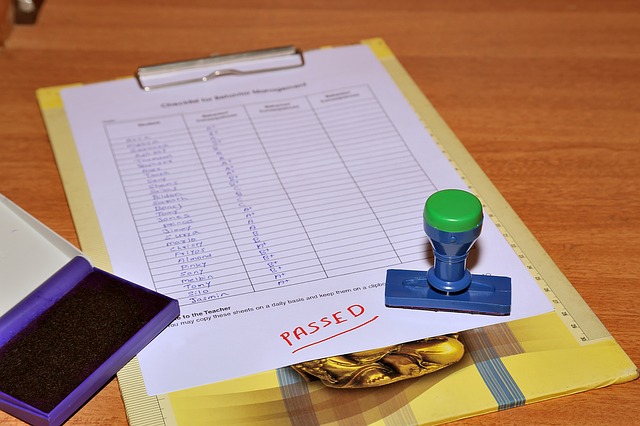
GPA’s can be one of the most fraught parts of the MBA application process, since you can’t really change it. What’s a good GPA for MBA programs? How can you determine the MBA GPA requirements at your prospective business schools?
In this article, I’ll go over a what a good GPA for business school is, how much and why your GPA matters in the course of MBA admissions, and what to do if your undergraduate GPA is lower than you’d like it to be.
What’s a Good GPA for Business School?
So, is there a specific GPA you’ll need to get into business school? The short answer is no. Like your GMAT score, your GPA is just one factor in a variety of admissions requirements, and different schools have different expectations when it comes to your undergraduate grades.
Most schools don’t have explicit minimum MBA GPA requirements. However, you can determine the expectations of a given school using the average GPA of their most recent incoming class(es). At most top 20 schools, the average GPA hovers around 3.5, making a 3.5 a solid baseline GPA for admissions. For very high-ranking MBA programs like Harvard and Stanford, average undergraduate GPAs are closer to 3.7.

Not sure how or what to study? Confused by how to improve your score in the shortest time possible? We've created the only Online GMAT Prep Program that identifies your strengths and weaknesses, customizes a study plan, coaches you through lessons and quizzes, and adapts your study plan as you improve.
We believe PrepScholar GMAT is the best GMAT prep program available, especially if you find it hard to organize your study schedule and don't want to spend a ton of money on the other companies' one-size-fits-all study plans.

How Much Does Your GPA Matter in MBA Admissions?
Like your GMAT score, your GPA is a significant factor in MBA admissions. There’s no doubt that admissions committees notice and value the information they can gather from your undergraduate transcript. While the GMAT is widely regarded as the most important determining factor in your chances of business school admissions, your GPA is nearly as significant to admissions committees. What’s more, average GPAs at top business schools have steadily risen over the years, making a high GPA even more important if you’re aiming for an elite MBA program.
However, MBA admissions is a holistic process that can’t be boiled down to just one number or factor. in addition to your GPA and GMAT, you’ll also turn in essays and/or other writing samples, letters of recommendation, and work experience. Many business schools will also require you to complete an interview. It’s possible, though challenging, to overcome a less-than-stellar GPA with other parts of your application.

Why Your Undergrad GPA Matters to Schools
Your undergraduate GPA is important because it’s the best indicator MBA admissions committees have of your ability to undertake the challenges of business school coursework. MBA programs are rigorous, and your school wants to know that you’re up to the task. Your past academic achievements are a good predictor of your future success.
The courses you choose to take, and your overall transcript, are just as or more important than the precise GPA number, though. The same GPA from a highly elite undergraduate institution is going to look different to an MBA admissions committee than it will from a mid-ranked school. Business schools will also take your coursework into account. A strong record of excellence in both quantitative and verbal skills, rather than a more one-sided curriculum, will be more likely to convince admissions officials that you’re capable of undertaking the rigor and variety of MBA coursework.
In addition, the average GPA of a school’s students helps to determine business school rankings (which in turn drives more applications from high-achieving students). Thus, schools that want to move up in rankings will sometimes place an emphasis on accepting students with higher GPAs.

How to Determine GPA Averages at Business Schools
Obviously you can’t change your undergraduate GPA once you have it, but looking up the average GPA for MBA programs you’re interested in will help you set realistic goals about where to apply.
To find the average GPAs of students at your prospective MBA programs, check out schools’ class profile pages (here’s Wharton’s 2018 class profile, for example). Most business schools have these class profiles, but if you can’t find one for a particular school, you can search the forums at GMAT Club to find its GPA info.
Once you have a list of prospective business schools, locate and record the average GPA at each one. To be safe, your GPA should be at or preferably above the average at the school in your list with the highest average GPA. If your GPA is significantly below a school’s MBA GPA requirements, a high GMAT score or exceptional work experience may help offset your disadvantage.

What to Do If You Have a Low GPA for Business School
If your GPA is lower than the MBA GPA requirements at your preferred schools, what’s your best bet for getting into a program anyway? Let’s go over what you can do or highlight in your business school apps if you have a low GPA for MBA programs you’re interested in.
#1: Supplement Your Transcript
Did you struggle in humanities courses in undergrad, or were classes in the STEM fields tougher for you? Take a critical eye to your undergrad transcript and pinpoint your weaknesses.
One way to demonstrate your commitment to business school and your academic career in general is to take postbaccalaureate coursework at your undergraduate institution or another one (online schools and local community colleges may be less expensive)—and show you can do better this time. Improving in your areas of weakness will demonstrate not only your capabilities in those subjects, but also your academic perseverance and dedication.
#2: Get a High Score on the GMAT or GRE
An exceptionally high GMAT or GRE score will help to offset a low GPA for business school applications. Prepare extensively (and effectively!) for the exam. A high score will demonstrate your intellectual abilities in MBA-relevant areas and your ability to do well under pressure.

#3: Highlight Exceptional Achievements
Extensive work experience, awards, and other demonstrations of high achievement in the workplace or in leadership roles can help make for a lackluster GPA on an MBA application. This is particularly true if you’re applying to executive MBA programs (programs geared towards working professionals, often with accelerated curriculum and increased hands-on experience) or if it’s been 5-10 years since you completed undergrad.
#4: Highlight Your Experience With a Feeder Company
Certain consulting/finance firms are known to serve as feeders for top business schools, with former employees making up disproportionate percentages of each incoming class. For example, McKinsey & Co., Boston Consulting Group, JP Morgan/Chase, Goldman Sachs, Blackstone Group, Summit Partners, and the Caryle Group each send a number of students to Harvard Business School (and other top MBA programs) every year. Other non-consulting employers, such as the U.S. military, the World Bank, Google, and Microsoft also serve as feeder companies for top MBA programs.
Want to improve your GMAT score by 60 points?
We have the industry's leading GMAT prep program. Built by Harvard, MIT, Stanford, and Wharton alumni and GMAT 99th percentile scorers, the program learns your strengths and weaknesses and customizes a curriculum so you get the most effective prep possible.

Working for one of these employers can give you an advantage for admission regardless of your GPA, since schools know that you’ve made it through a competitive hiring process and succeed in a competitive work environment. However, applying from a feeder company often also means that you’re competing with other employees, many of whom may have stronger academic credentials, so you’ll still need to find a way to stand out.
What’s Next?
Not sure if an MBA is right for you? Check out our intro guide to MBA programs for more information on MBA admissions requirements and whether you should go to business school.
Concerned about how your GMAT score will impact your chances of getting into business school? Our list of GMAT scores for top schools will help.
 PrepScholar GMAT
PrepScholar GMAT